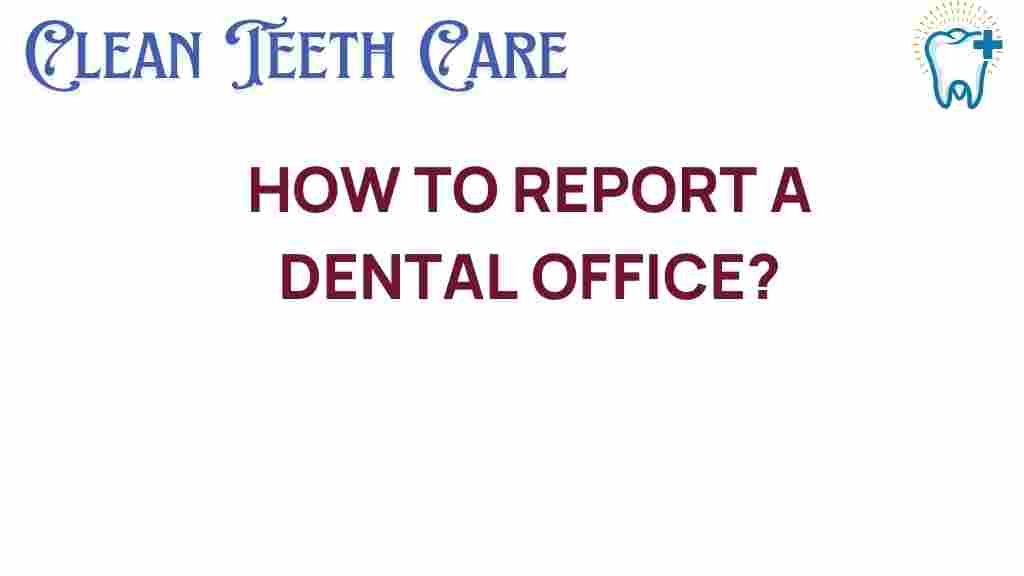Unveiling the Secrets: How to Effectively Report a Dental Office
When it comes to maintaining our oral health care, we trust dental offices to provide the best services possible. However, there are times when patients may encounter issues that compromise their rights or the quality of care. Understanding how to effectively report a dental office is crucial for ensuring that professional standards are upheld and that patient rights are protected. This article will guide you through the complaint process, discuss dental ethics, and provide valuable insights into consumer advocacy in oral health care.
Understanding Patient Rights in Dental Care
Before delving into the complaint process, it’s essential to understand your rights as a dental patient. Patients have the right to:
- Receive safe and effective treatment.
- Be informed about their treatment options.
- Consent to or refuse treatment.
- Access their medical records.
- Report unethical behavior without fear of retaliation.
Understanding these rights empowers you to take action if you feel they are being violated during your visits to a dental office.
When to Report a Dental Office
There are several scenarios where reporting a dental office may be necessary. Some common issues include:
- Substandard care or treatment.
- Unethical practices, such as unnecessary procedures.
- Discrimination or violation of patient privacy.
- Inadequate sterilization practices leading to potential health risks.
If you have experienced any of these situations, it’s important to take action to protect yourself and others.
The Complaint Process: Step-by-Step Guide
Effectively reporting a dental office involves a systematic approach. Here’s a detailed breakdown of the complaint process:
Step 1: Document Your Experience
Before filing a complaint, gather all relevant information regarding your experience. This includes:
- Dates and times of your visits.
- The names of dental staff members you interacted with.
- A detailed description of the issues faced.
- Any evidence such as photographs, emails, or written correspondence.
Thorough documentation is crucial for substantiating your claims.
Step 2: Communicate with the Dental Office
Many issues can often be resolved by directly communicating with the dental office. Consider the following steps:
- Request a meeting with the office manager or the dentist.
- Clearly explain your concerns and provide your documentation.
- Ask for a resolution or clarification on your issues.
Document this conversation as well, noting the date, time, and outcome.
Step 3: File a Formal Complaint
If the issue remains unresolved, you can proceed to file a formal complaint. This can be done through:
- Your state dental board: Most states have a dental board that regulates dental practices. Visit their website to find the appropriate forms and procedures.
- Professional dental associations: Organizations like the American Dental Association (ADA) may also have complaint processes in place.
Ensure that you include all supporting documentation and be clear about your desired outcome.
Step 4: Engage Consumer Advocacy Groups
If you feel that your complaint is not being addressed adequately, consider reaching out to consumer advocacy organizations. These groups can provide guidance and support in navigating the complaint process. They may also help to:
- Advocate for your rights as a patient.
- Raise awareness about unethical practices.
- Provide resources for other patients facing similar issues.
For additional support, you can visit Consumer Reports for advice on handling consumer complaints in healthcare.
Troubleshooting Tips When Reporting Issues
Reporting a dental office can be daunting. Here are some troubleshooting tips to help you navigate the process:
- Stay Professional: Approach the situation with a calm and respectful demeanor, even if you are frustrated.
- Be Clear and Concise: When writing your complaint, stick to the facts and avoid emotional language.
- Follow Up: After submitting your complaint, follow up to check on its status.
- Educate Yourself: Familiarize yourself with dental ethics and standards in your state to strengthen your complaint.
Conclusion: Advocating for Your Oral Health Care
Reporting a dental office may feel overwhelming, but it is a vital step in advocating for your rights and ensuring that ethical standards in oral health care are maintained. By understanding the complaint process and knowing your rights, you can effectively address issues and contribute to better dental practices. Remember, you are not alone in this journey. Engage with consumer advocacy groups and utilize the resources available to you. Together, we can work towards a healthier and more accountable dental care environment.
For more information on patient rights and ethical practices in dentistry, visit the American Dental Association website.
This article is in the category Conditions and created by CleanTeethCare Team
